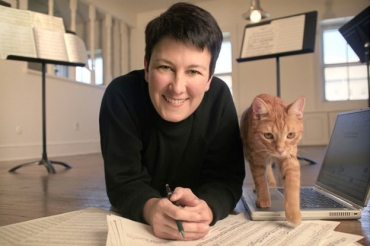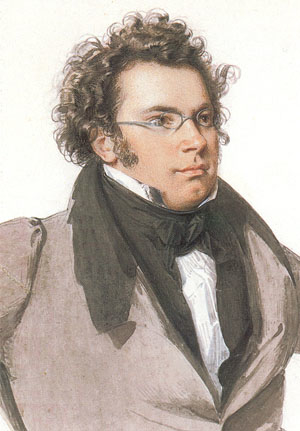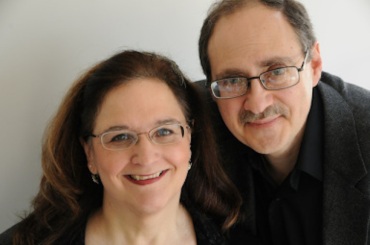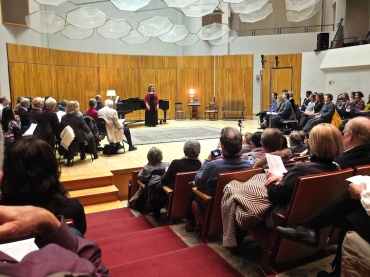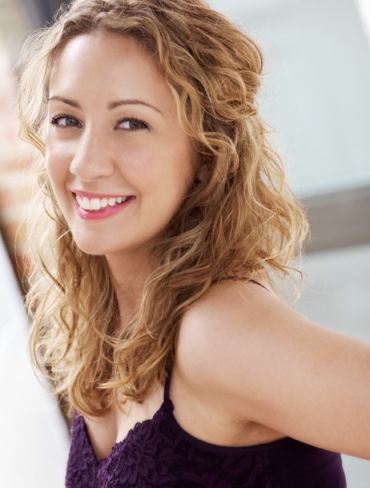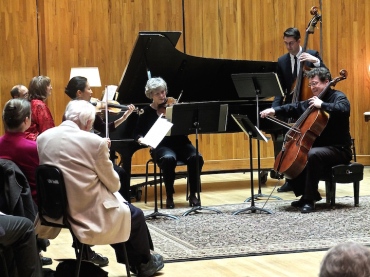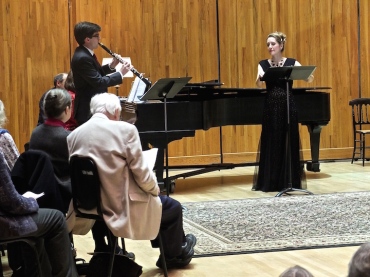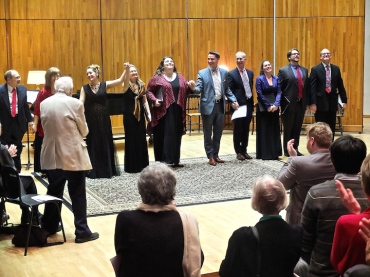The Well-Tempered Ear
Classical music: Wind music is in the spotlight this coming week at the UW-Madison
2 Comments
IF YOU LIKE A CERTAIN BLOG POST, PLEASE FORWARD A LINK TO IT OR SHARE IT (not just “Like It”) ON FACEBOOK. Performers can use the extra exposure to draw potential audience members to an event.
By Jacob Stockinger
Last weekend brought the fifth annual Brass Fest to the University of Wisconsin-Madison’s Mead Witter School of Music.
This week, wind music takes center stage at the UW-Madison.
Here is a listing of the FREE events — except for the concert in Baraboo on Friday — that are open to the public:
WEDNESDAY
On this Wednesday, Oct. 3, at 7:30 p.m. in Mills Hall, the veteran Wingra Wind Quintet (below), made up of UW faculty members, will perform a FREE program called “I Hate Music,” taken from the title of a song cycle by Leonard Bernstein. (You can hear a song, sung by Barbara Bonney, from “I Hate Music” in the YouTube video at the bottom.)
The composers are all American and include Bernstein as well as Aaron Copland, Lukas Foss, David Diamond and Walter Piston.
The guest artist is soprano Sarah Brailey, a UW-Madison alumna, who just excelled last week in Baroque music by Johann Sebastian Bach and who has established a national reputation while winning high praise from The New York Times.
For details about the specific pieces on the program as well as more background about the Wingra Wind Quintet (below, in a photo by Katrin Talbot), which was founded in 1965, go to:
https://www.music.wisc.edu/event/wingra-wind-quintet-4/
FRIDAY
On Friday, Oct. 5, at 7:30 in the Al Ringling Theatre in Baraboo, the Wingra Wind Quintet will team up with the celebrated Pro Arte Quartet (below in a photo by Rick Langer) and guest double bassist Kris Saebo, to perform Franz Schubert’s Octet for winds and strings, D. 803. For more information, including purchasing tickets, go to: http://www.alringling.org/events
This coming Friday, Oct. 5, at 8 p.m. In Mills Hall, the UW Wind Ensemble (below), under conductor Scott Teeple and two graduate student conductors –- Ross Wolf and Cole Hairston — will perform a FREE concert of varied music from Giovanni Gabrieli and Johann Sebastian Bach to Peter Ilyich Tchaikovsky and Ralph Vaughan Williams.
For more the complete program, go to: https://www.music.wisc.edu/event/uw-wind-ensemble-3/
SUNDAY
On Sunday afternoon, Oct. 7, at 2 p.m. in Mills Hall, UW professor of composition and jazz saxophone Les Thimmig (below) will present a FREE 10-year retrospective of his compositions for different kinds of clarinets.
Also performing are his faculty colleagues clarinetist Alicia Lee (below) and pianist Jessica Johnson.
For information about Thimmig and the concert’s program, go to: https://www.music.wisc.edu/event/faculty-recital-compositions-of-les-thimmig-solo-and-duo/
At 4 p.m. on Sunday, Oct. 7, in Morphy Recital Hall, guest flutist John Bailey (below), who teaches at the University of Nebraska-Lincoln, gives a FREE lecture and recital of music by Wolfgang Amadeus Mozart, Philippe Gaubert and Theodor Blumer. Sorry, no specific works are mentioned.
Bailey will be joined by UW pianist Daniel Fung.
For extensive background about Bailey, who is a member of the Moran Woodwind Quintet, go to: https://www.music.wisc.edu/event/guest-artist-recital-and-lecture-john-bailey-flute/
Tags: #AaronCopland, #AlRinglingTheatre, #AmericanComposer, #BarabooWisconsin, #BarbaraBonney, #BaroqueMusic, #BassoonMusic, #BlogPost, #BlogPosting, #BrassMusic, #ChamberMusic, #ClarinetMusic, #DavidDiamond, #DoubleBass, #FacebookPost, #FacultyMember, #FluteMusic, #FranzSchubert, #GiovanniGabrieli, #GraduateStudent, #GuestArtist, #HornMusic, #IHateMusic, #JazzMusic, #JohannSebastianBach, #JohnBailey, #LastWeek, #LeonardBernstein, #LesThimmig, #LukasFoss, #MeadWitterSchoolofMusic, #MoranWoodwindQuintet, #NationalReputation, #OboeMusic, #PeterIlyichTchaikovsky, #PhilippeGaubert, #ProArteQuartet, #RalphVaughanWilliams, #RinglingBrothers, #SarahBrailey, #SaxophoneMusic, #SongCycle, #StringQuartet, #TheNewYorkTImes, #UniversityofNebraska, #UniversityofNebraska-LIncoln, #UniversityofWisconsin, #UniversityofWisconsin-Madison, #WalterPiston, #WindMusic, #WindQuintet, #WingraWindQuintet, #WolfgangAmadeusMozart, #YouTubevideo, Aaron Copland, Al. Ringling Theatre, American, Arts, audience, Bach, background, Baraboo, Barbara Bonney, Baroque, Bassoon, Cello, Chamber music, clainetist, clarinet, Classical music, composer, Composition, David Diamond, double bass, Early music, event, Facebook, faculty member, flute, Franz Schubert, free, Gabrieli, Horn, Jacob Stockinger, Jazz, John Bailey, last, Leonard Bernstein, Les Thimmig, Lincoln, Lukas Foss, Madison, Mead Witter School of Music, Moran Woodwind Quintet, Mozart, Music, New York Times, Oboe, Octet, Philippe Gaubert, Pianist, Piano, praise, Pro Arte Quartet, professor, public, Ralph Vaughan Williams, recital, retropective, Ringling Brothers, Schubert, Sonata, song, song cycle, soprano, Student, Tchaikovsky, The New York Times, Theodor Blumer, TheodorBlumer, tickets, title, United States, University of Wisconsin-Madison School of Music, University of Wisconsin–Madison, Veteran, Viola, Violin, Walter Piston, week, wind music, Wind quintet, Wings Wind Quintet, Wisconsin, Wolfgang Amadeus Mozart, YouTube
Classical music: The Oakwood Chamber Players open their new “Vignettes” season with concerts on Saturday night and Sunday afternoon
Leave a Comment
A CORRECTION: The Ear wants to apologize for and correct an error he made in yesterday’s blog post. The correct time and address for the all-Schubert concert by the Mosaic Chamber Players is on Saturday night at 7:30 p.m. in the chapel of the First Congregational United Church of Christ, 1609 University Avenue, near Camp Randall Stadium.
By Jacob Stockinger
The Oakwood Chamber Players (below) will begin their 2018-2019 season series “Vignettes” with concerts on Saturday, Sept. 15, at 7 p.m. and Sunday, Sept. 16, at 2 p.m.
The concerts will both be held at the Oakwood Center for Arts and Education, 6209 Mineral Point Road, on Madison’s far west side near West Towne Mall.
Tickets can be purchased with cash or personal checks at the door: $25 for general admission, $20 for seniors 62 and over; and $5 students. Visit www.oakwoodchamberplayers.com or call (608) 230-4316 for more information for individual and season tickets.
Once again, the group will explore largely new or unknown composers and neglected music.
Each program of the 2018-19 series will focus on how composers create specific themes to tell stories, and represent emotions, places or characteristics to enhance the listening experience.
Central to the program is poetry and narration paired with music that will feature Boston-based guest soprano Mary Mackenzie (below). She has been described by The New York Times as “a soprano of extraordinary agility and concentration,” and the Boston Globe as “sensational.”
Mackenzie is a passionate performer of contemporary vocal music, and has appeared with the Chameleon Arts Ensemble of Boston, Collage New Music, the Da Capo Chamber Players, Fulcrum Point New Music Project, and The Knights.
American composer Byron Adams (below) was commissioned by renowned American clarinetist Yehuda Weiner to set Nightingales, a poem by British Victorian poet Robert Bridges, as a memorial to his brother. The composer chose a quartet of soprano, clarinet, cello and piano to evoke the breathtaking beauty of the natural world that is overlaid with a sense of loss and longing.
By contrast, the Pulitzer Prize-winning American composer Jennifer Higdon (below, in a photo by Candace DiCarlo) set four poems that have titles that reference roses by James Whitcomb Riley for the combination of flute, soprano and piano.
Bentley Roses was written as a surprise tribute for the retirement of her former music teacher, Judith Bentley. The settings are sunny and accessible, the music weaves around the words with swirling energy, coy interactions, and graceful interplay.
The yearning Vocalise by conductor, composer and pianist Andre Previn conveys emotion using the voice without words as a chamber instrument. The combination of soprano, cello and piano carries the shifting harmonies and sinuous melodic line through a series of subtle yet powerful transformations. (You can hear Previn’s beautiful “Vocalise,” with soprano Barbara Bonney and the the composer at the piano, in the YouTube video at the bottom.)
A second piece by Previn (below) piece puts the cello and soprano in conversation with his setting of Pulitzer Prize-winning writer Toni Morrison’s poem Stones.
American film composer and bassoonist Charles Fernandez (below) wrote Quatuor Parisienne (Parisian Quartet) for flute, oboe, clarinet and bassoon. It consists of three movements: a tongue-in-cheek march; a gracefully flowing reflection: and a farcical musical conversation with a dash of merriment.
Budapest-based clarinetist and composer Endre Szervanszky (below) wrote his Quintet No. 1 in 1953. Audiences will hear some characteristics similar to the writing of Kodaly and Bartok. It is a pleasing four-movement work that shows his strong understanding of each of the instruments, demanding both melodic expressiveness and technical panache.
The program concludes with poetry by British writer Roald Dahl, known for his darkly humorous children’s stories. Composer Martin Butler (below, in a photo by Katie Vandyck) incorporated The Pig, The Tummy Beast, and The Crocodile into his piece Dirty Beasts for narrator, piano and woodwind quintet. Butler mirrors the acerbic wit of the text with clever effects, closing out the program with some unexpected twists and turns.
Guest performers are soprano Mary Mackenzie, pianist Joseph Ross (below top) and oboist Laura Medisky (below bottom).
They join Oakwood Chamber Players members Marilyn Chohaney, flute; Nancy Mackenzie, clarinet; Amanda Szczys, bassoon; Anne Aley, horn; and Maggie Darby Townsend, cello.
This is the first of five concerts in the Oakwood Chamber Players’ 2018-19 season series entitled Vignettes. Remaining concerts will take place on Nov. 24 and 25; Jan. 12 and 13; March 2 and 3; and May 18 and 19. For more information about the Oakwood Chamber Players and their new season, go to: https://www.oakwoodchamberplayers.com
The Oakwood Chamber Players are a group of Madison-area professional musicians who play with the Madison Symphony Orchestra and the Wisconsin Chamber Orchestra and have rehearsed and performed at Oakwood Village for over 30 years.
The Oakwood Chamber Players are a professional music ensemble proudly supported by Oakwood Lutheran Senior Ministries and the Oakwood Foundation.
Tags: #AmericanComposer, #AndrePrevin, #BarbaraBonney, #BelaBartok, #BlogPost, #BostonGlobe, #BritishPoet, #BudapestHungary, #ByronAdams, #CampRandallStadium, #ChamberMusic, #ChameleonArtsEnsemble, #ChristianChurch, #ChristianReligion, #CollageNewMusic, #ContemporaryComposer, #ContemporaryMusic, #DaCapoChamberPlayers, #EndreServanszky, #FilmComposer, #FirstCongregationalUnitedChurchofChrist, #FranzSchubert, #FulcrumPointNewMusicProject, #JamesWhitcombRiley, #JenniferHigdon, #JesusChrist, #LivingComposer, #LutheranReligion, #MadisonSymphonyOrchestra, #MartinButler, #MaryMackenzie, #MosaicChamberPlayers, #MusicTeacher, #NaturalWorld, #NewMusic, #OakwoodCenterforArtsandEducation, #OakwoodChamberPlayers, #OakwoodVillage, #OakwoodVillageWest, #OperaMusic, #PianoQuintet, #PulitzerPrize, #RoaldDahl, #RobertBridges, #TheKnights, #TheNewYorkTImes, #ToniMorrison, #UniversityofWisconsin, #UniversityofWisconsin-Madison, #VictorianAge, #VictorianPoet, #WestTowneMall, #WisconsinChamberOrchestra, #WoodwindQuintet, #YehudaWeiner, #YouTubevideo, #ZoltanKodaly, accessible, American, Andre Previn, Arts, audience, Barbara Bonney, Bartok, Bassoon, bassoonist, beast, beauty, blog, Boston, Boston Globe, British, Budapest, Byron Adams, Camp Randall Stadium, Cello, Chamber music, Chameleon Arts Ensemble, chapel, children, clarinet, clarinetist, Classical music, Collage New Music, composer, conductor, conversation, coy, crocodile, Da Capo Chamber Players, emotion, Endre Servanszky, energy, England, ensemble, experience, expression, expressive, film, film composer, First Congregational United Church of Christ, flute, Fulcrum Point New Music Project, harmony, Horn, Humor, Hungary, Jacob Stockinger, James Whitcomb Riley, Jennifer Higdon, Jesus Christ, Kodaly, listening, longing, loss, Lutheran, Lutheran religion, Madison, Madison Symphony Orchestra, march, Martin Butler, melodic, melody, Mosaic Chamber Players, movement, movie, music teacher, Musician, narrator, natural world, nature, New Music, Oakwood Center for Arts and Education, Oakwood Chamber Players, Oakwood Village, Oakwood Village West, Oboe, opera, panache, Paris, Parisian, Passion, passionate, performer, Pianist, Piano, pig, poem, Poetry, post, professional, project, Pulitzer Prize, Quartet, quintet, reflection, Retirement, Roald Dahl, Robert Bridges, Schubert, singer, soprano, stories, story, Teacher, techique, technical, text, The Knights, UK, United States, University of Wisconsin-Madison School of Music, University of Wisconsin–Madison, Victorian, Violin, vocal music, vocalise, West Towne Mall, Wisconsin, Wisconsin Chamber Orchestra, wit, woodwind, Writer, Yehuda Weiner, YouTube
Classical music: The third annual Schubertiade at the University of Wisconsin-Madison School of Music was so popular and so successful, it should serve as a model for other collaborative concerts featuring other composers. Plus, a FREE concert at noon on Friday offers music of Philip Glass, Zoltan Kodaly and others
3 Comments
ALERT: This week’s FREE Friday Noon Musicale, held from 12:15 to 1 p.m. at the First Unitarian Society of Madison, 900 University Bay Drive, features Danielle Breisach, flute; Jeff Breisach, horn; Peter Miliczky and Clare Bresnahan, violins; Josh Dieringer, viola; Andrew Briggs, cello; and Jana Avedyahn, piano in music by Philip Glass, Jonathan Russ, Robert Ward and Zoltan Kodaly.
By Jacob Stockinger
Last Saturday night, The Ear attended the third annual Schubertiade in Mills Hall at the University of Wisconsin-Madison School of Music.
In case you aren’t acquainted with what a Schubertiade is, you should know that it is patterned after the kind of informal soirees, held in private homes and salons, where the early Romantic composer Franz Schubert (below, 1797-1828) often premiered to friends his latest songs, piano works and chamber music. The UW-Madison Schubertiades celebrate the composer’s Jan. 31 birthday and usually kick off the second semester of concerts.
Below is a link to a previous posting — with the complete program and list of performers — about this year’s Schubertiade.
It featured an informative interview with pianist and singer Bill Lutes (below right). Lutes, along his wife Martha Fischer (below left) – a professor of collaborative piano at the UW-Madison who also sings – co-founded and co-directs the event. Both of them also performed throughout the event:
And you can use the search engine on this blog to check out the Schubertiades in 2014 and 2015.
Kudos and bravos are in order. There were so many things to like about the Schubertiade.
Here are a few:
- It remained an informal and very listener-friendly event with great pacing. The idea of sitting people on the stage (below top) to recreate a salon gathering is inspired. What’s more, it works and puts the audience in exactly the right mood. Plus, there was exactly the right amount of commentary — not too little or too much.
- The program, organized this year around the theme of nature, cohered. It also proved convincing as a vehicle for so many different kinds of Schubert’s music, mostly shorter works – solo songs, larger choral works, piano duets and chamber music.
- The quality of the performances was amazingly even and amazingly engaging. The audience was so quiet, you could tell that it was wholly absorbed and not distracted.
- The musical works were extremely well matched to the performers, and played to their strengths and temperaments.
- The imported guest artist – soprano Jamie-Rose Guarrine (below bottom, in a photo by Peter Konerko), a graduate of the UW-Madison who sings opera and is now a professor at the University of Massachusetts in Amherst – proved a complete success in both her charming presentation and her first-class performances.
- Despite the overall evenness and consistency, there were some standout moments. Judging from the applause, the audience clearly loved the song ”The Trout” followed by the theme-and-variations movement, based on the song, from the famous “Trout” Piano Quintet (below):
Another show-stopper was the superb rendition, both highly dramatic and subtly lyrical, of “Lebensstürme” (Life’s Storms) for piano, four hands, played by Lutes and Fisher.
And the closing number, the famous “Shepherd on the Rock” for soprano, clarinet and piano, brought the house to a standing ovation. (The Ear hopes that this and other moments were recorded and get posted for streaming from the UW School of Music’s website or SoundCloud.) In the YouTube video at the bottom, you can hear this sublime late work in a performance by soprano Barbara Bonney, clarinetist David Shifrin and pianist Andre Watts for the Chamber Music Society of Lincoln Center.
In short, the third annual Schubertiade proved a completely enjoyable and thoroughly persuasive evening of performances that attested to the quality, empathy and variety of the music that Franz Schubert created in his short life of 31 years.
But perhaps the best, most memorable part of the event was to see the collaboration and cooperation that was so evident.
The Schubertiade featured an impressive lineup of faculty members, students and alumni. The many performers came from various departments: piano, voice, strings, brass, winds and opera.
We see and hear far too little of that cooperation, it seems to The Ear.
And when he talked to another loyal fan of UW music and of the Schubertiade, that fan agreed that such single-composer events are popular with the public and should take place more often. They serve as samplers with both familiar and unfamiliar works.
So maybe the Schubertiade could serve as a model for similar events with other composers whose body of work is, like Schubert’s, both first-rate and very varied.
Some composers who come immediately to mind are Johann Sebastian Bach, Wolfgang Amadeus Mozart, Ludwig van Beethoven, Robert Schumann and Johannes Brahms. And there are no doubt others who could be featured.
Such collaborative events would also prove popular with the public, The Ear surmises. After all, this third Schubertiade seemed to draw the biggest audience yet – a two-thirds house of about 500 – even on the night when a UW-Madison hockey game was competing for attention.
If you didn’t go, it was your loss. But there will be another Schubertiade next January, one presumes. Don’t miss it!
And if you did go to this year’s Schubertiade, leave whatever you care to say in the COMMENTS section.
The Ear wants to hear.
Tags: alto, Arts, Bach, Barbara Bonney, baritone, bass, Brahms, Cello, Chamber music, Chamber Music Society of Lincoln Center, choral music, clarinet, Classical music, David Shifrin, double bass, First Unitarian Society of Madison, Franz Schubert, Horn, Jacob Stockinger, Jonathan Russ, Ludwig van Beethoven, Madison, Mozart, Music, opera, Philip Glass, Piano, Robert Ward, Schubert, Schubertiade, Schumann, song, soprano, tenor, Trout, United States, University of Wisconsin-Madison School of Music, University of Wisconsin–Madison, video, Viola, Violin, vocal music, Wisconsin, Wolfgang Amadeus Mozart, YouTube, Zoltan Kodaly
Classical music: Ten Mozart performers name their favorite Mozart works to mark the composer’s 259th birthday this past week for the BBC Music Magazine.
7 Comments
By Jacob Stockinger
This past week -– on Tuesday to be exact -– we celebrated the birth of Wolfgang Amadeus Mozart, who was born in 1756 and died in 1791.
It was his 259th birthday.
For all his fame, familiarity and popularity, Mozart is a curiously underestimated composer. His best work is so sublimely beautiful that it is easy to overlook how different and revolutionary it was in its day. Mozart changed music, and we don’t always appreciate that fact.
Anyway, a lot of radio stations, including Sirius XM Satellite Radio, WFMT in Chicago, WQXR in New York City and Wisconsin Public Radio, broadcast a lot of Mozart on that day.
But one of the most interesting celebrations that The Ear saw came from BBC Music Magazine. It asked 10 celebrated Mozart performers — including pianist and conductor Daniel Barenboim, conductor Sir Neville Marriner, pianist Dame Mitsuko Uchida, conductor Sir Roger Norrington and singer Barbara Bonney — to name their favorite work.
It covered the range of Mozart’s enormous output: piano music, string quartets, operas, symphonies, violin works, operas and of course choral works. And the website provided generous sound samples of the works.
Here is a link:
http://www.classical-music.com/article/which-your-favourite-piece-mozart
At the bottom is a YouTube video of one of my favorite Mozart works — the Piano Sonata in C minor, played by Daniel Barenboim. It was also a favorite of Ludwig van Beethoven who seemed to use some of it in the slow movement of the familiar “Pathetique” Sonata.
What is your favorite Mozart work?
What else do you want to say about Mozart?
The Ear wants to hear.
Tags: Arts, Barbara Bonney, BBC Music Magazine, Beethoven, Chicago, choral music, Classical music, Compact Disc, composer, Daniel Barenboim, Jacob Stockinger, Ludwig van Beethoven, Madison, Mitsuko Uchida, Mozart, Music, Neville Marriner, New York City, opera, Orchestra, Piano, Roger Norrington, Sirius XM Radio, String quartet, University of Wisconsin-Madison School of Music, University of Wisconsin–Madison, Vienna, Violin, vocal music, wisconsin public radio, WMFT, Wolfgang Amadeus Mozart, WQXR, YouTube
- May 2024
- April 2024
- March 2024
- February 2024
- January 2024
- December 2023
- November 2023
- October 2023
- September 2023
- August 2023
- July 2023
- June 2023
- May 2023
- April 2023
- March 2023
- February 2023
- January 2023
- December 2022
- October 2022
- September 2022
- June 2022
- May 2022
- April 2022
- March 2022
- July 2021
- June 2021
- May 2021
- April 2021
- March 2021
- February 2021
- January 2021
- December 2020
- November 2020
- October 2020
- September 2020
- August 2020
- July 2020
- June 2020
- May 2020
- April 2020
- March 2020
- February 2020
- January 2020
- December 2019
- November 2019
- October 2019
- September 2019
- August 2019
- July 2019
- June 2019
- May 2019
- April 2019
- March 2019
- February 2019
- January 2019
- December 2018
- November 2018
- October 2018
- September 2018
- August 2018
- July 2018
- June 2018
- May 2018
- April 2018
- March 2018
- February 2018
- January 2018
- December 2017
- November 2017
- October 2017
- September 2017
- August 2017
- July 2017
- June 2017
- May 2017
- April 2017
- March 2017
- February 2017
- January 2017
- December 2016
- November 2016
- October 2016
- September 2016
- August 2016
- July 2016
- June 2016
- May 2016
- April 2016
- March 2016
- February 2016
- January 2016
- December 2015
- November 2015
- October 2015
- September 2015
- August 2015
- July 2015
- June 2015
- May 2015
- April 2015
- March 2015
- February 2015
- January 2015
- December 2014
- November 2014
- October 2014
- September 2014
- August 2014
- July 2014
- June 2014
- May 2014
- April 2014
- March 2014
- February 2014
- January 2014
- December 2013
- November 2013
- October 2013
- September 2013
- August 2013
- July 2013
- June 2013
- May 2013
- April 2013
- March 2013
- February 2013
- January 2013
- December 2012
- November 2012
- October 2012
- September 2012
- August 2012
- July 2012
- June 2012
- May 2012
- April 2012
- March 2012
- February 2012
- January 2012
- December 2011
- November 2011
- October 2011
- September 2011
- August 2011
- July 2011
- June 2011
- May 2011
- April 2011
- March 2011
- February 2011
- January 2011
- December 2010
- November 2010
- October 2010
- September 2010
- August 2010
- July 2010
- June 2010
- May 2010
- April 2010
- March 2010
- February 2010
- January 2010
- December 2009
- November 2009
- October 2009
- September 2009
- August 2009
Archives
- 2,491,419 hits
Blog Stats
Recent Comments
| Brian Jefferies on Classical music: A major reass… | |
| welltemperedear on What made Beethoven sick and… | |
| rlhess5d5b7e5dff on What made Beethoven sick and… | |
| welltemperedear on Beethoven’s Ninth turns 200… | |
| Robert Graebner on Beethoven’s Ninth turns 200… |
Tags
#BlogPost #BlogPosting #ChamberMusic #FacebookPost #FacebookPosting #MeadWitterSchoolofMusic #TheEar #UniversityofWisconsin-Madison #YouTubevideo Arts audience Bach Baroque Beethoven blog Cello Chamber music choral music Classical music Compact Disc composer Concert concerto conductor Early music Facebook forward Franz Schubert George Frideric Handel Jacob Stockinger Johannes Brahms Johann Sebastian Bach John DeMain like link Ludwig van Beethoven Madison Madison Opera Madison Symphony Orchestra Mead Witter School of Music Mozart Music New Music New York City NPR opera Orchestra Overture Center performer Pianist Piano post posting program share singer Sonata song soprano String quartet Student symphony tag The Ear United States University of Wisconsin-Madison School of Music University of Wisconsin–Madison Viola Violin vocal music Wisconsin Wisconsin Chamber Orchestra wisconsin public radio Wolfgang Amadeus Mozart YouTube








